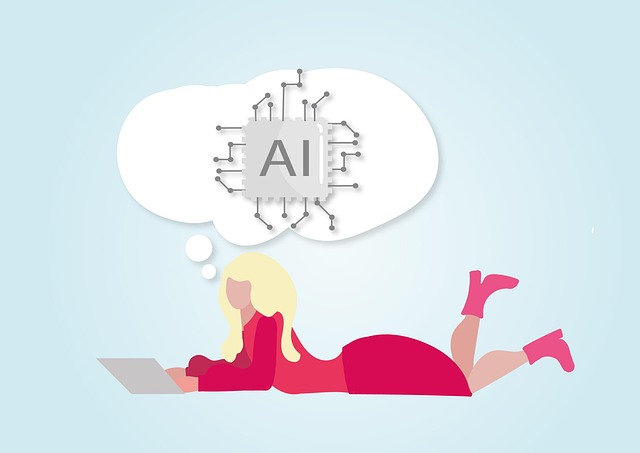AI chatbots integrated into smart home systems revolutionize assistance by understanding habits and preferences to manage tasks like scheduling and reminders. Through natural language processing, users interact hands-free via voice or text commands. These chatbots suggest personalized settings for lights, temperature, and security, proactively meeting needs before expressed. Capabilities include predictive maintenance, energy optimization based on data analysis, enhanced home security with real-time threat detection, and automation of lighting, temperature control, and security measures.
The integration of Artificial Intelligence (AI) into smart home systems is unlocking a future filled with personalized assistance, enhanced security, and sustainable living. From AI chatbots acting as virtual home managers to voice control systems with natural language understanding, these innovations are transforming how we interact with our surroundings. This article explores key areas where AI is revolutionizing smart homes, focusing on personalized assistance through AI chatbots, energy optimization, predictive maintenance, and advanced security features.
- Personalized Assistance: AI Chatbot as Your Virtual Home Manager
- Voice Control and Natural Language Understanding in Smart Homes
- Predictive Maintenance: AI's Role in Ensuring Safety and Efficiency
- Energy Optimization: AI-Driven Smart Grid for Sustainable Living
- Enhanced Security: AI-Powered Surveillance Systems and Home Automation
Personalized Assistance: AI Chatbot as Your Virtual Home Manager

Imagine having a personal assistant that understands your habits, preferences, and routines—all while learning and adapting as you do. This is the potential of an AI chatbot integrated into smart home systems. As your virtual home manager, it can assist with daily tasks such as scheduling appointments, setting reminders, and managing calendars. With natural language processing, users can interact with the chatbot through voice commands or text messages, making home management more intuitive and hands-free.
Moreover, this AI companion can go beyond basic assistance. It could suggest personalized settings for lights, temperature, and security based on individual needs and preferences. By learning user behavior, it becomes a proactive manager, anticipating requirements before they’re even expressed. This level of personalization not only enhances convenience but also contributes to energy efficiency and home security.
Voice Control and Natural Language Understanding in Smart Homes

Voice control has already become a common feature in smart home systems, allowing users to interact with their devices hands-free. With advancements in AI and natural language understanding (NLU), this functionality is set to become even more sophisticated. AI chatbots can now interpret complex commands and context, enabling seamless communication between users and their homes. For instance, instead of saying “turn on the lights gradually,” a user might simply request, “set a relaxing mood lighting for bedtime.”
This evolution promises a more intuitive and personalized smart home experience. As NLU algorithms continue to learn and adapt, they can anticipate user needs, offer tailored suggestions, and even predict preferences based on historical data. This level of understanding could lead to more efficient energy management, improved security through context-aware alerts, and enhanced overall convenience in daily life.
Predictive Maintenance: AI's Role in Ensuring Safety and Efficiency

AI chatbots are poised to revolutionize predictive maintenance within smart home systems, enhancing both safety and efficiency. By leveraging machine learning algorithms, these intelligent assistants can analyze vast amounts of data from sensors and devices, identifying patterns indicative of potential failures or malfunctioning components. This proactive approach allows for scheduled maintenance before issues escalate, minimizing the risk of accidents and optimizing the lifespan of appliances.
Moreover, AI chatbots can provide personalized recommendations to homeowners based on their specific usage patterns and historical data. They can anticipate replacement needs, suggest energy-saving adjustments, and offer tips to improve overall system performance. This level of personalization not only contributes to a more sustainable household but also empowers users with valuable insights into their smart home’s inner workings.
Energy Optimization: AI-Driven Smart Grid for Sustainable Living

The integration of Artificial Intelligence (AI) into smart home systems presents a promising avenue for achieving energy optimization and promoting sustainable living. AI chatbots, in particular, can play a pivotal role in this domain by serving as intelligent grid managers. These chatbots are equipped to analyze vast amounts of data from various smart devices within a household, such as thermostats, lighting systems, and appliances. By understanding user preferences and patterns, they can optimize energy consumption in real-time, ensuring efficient use without compromising comfort.
For instance, an AI chatbot could dynamically adjust temperature settings based on occupancy, weather conditions, and individual schedules. It might also suggest energy-saving practices by providing personalized recommendations for appliance usage, lighting adjustments, or even predicting and scheduling maintenance tasks to reduce energy wastage. This level of automation not only contributes to environmental sustainability but also empowers users to make informed choices, fostering a culture of eco-conscious living.
Enhanced Security: AI-Powered Surveillance Systems and Home Automation

AI-powered surveillance systems are poised to revolutionize smart home security, offering advanced protection through seamless integration with existing automation features. By leveraging machine learning algorithms, these systems can analyze real-time footage and sensor data to detect unusual patterns or behaviors, enhancing the ability to identify potential threats. For instance, an AI chatbot could be programmed to alert homeowners about suspicious activities, providing a layer of proactive security.
Additionally, home automation can be significantly enhanced through AI technology, creating a more responsive and adaptive living environment. Smart devices equipped with artificial intelligence can learn homeowners’ routines and preferences, automating tasks like lighting adjustments, temperature control, and security measures based on personal profiles. This not only improves convenience but also contributes to energy efficiency and overall home security by ensuring that potential vulnerabilities are addressed promptly.
